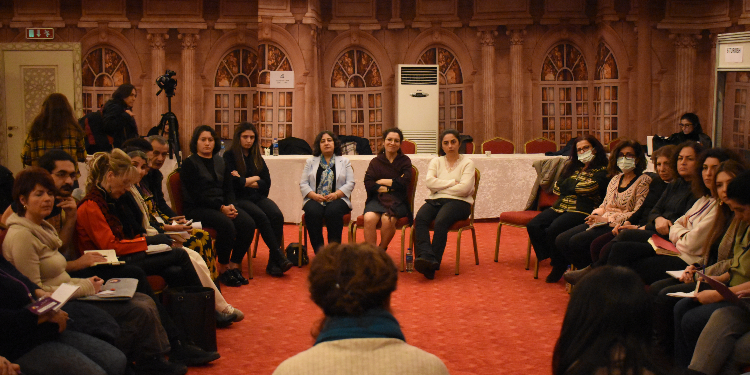
Tevgera Jinên Azad-TJA (Free Women’s Movement) organized the conference “Breaking the Walls Around Women Political Prisoners: Silent Chain” in Amed with the participation of women from different countries. The conference continued on its second day with workshops. The workshops held on the day included “Media and Press”, “The Power of Art”, “Law and Advocacy”, and “Mission of Politics”.
In the workshop moderated by journalists Öznur Değer and Esra Çiftçi, discussions were held on the role and effective use of media and press in advocating for women political prisoners. Journalist Öznur Değer emphasized that prisons have become inevitable spaces in everyone’s life, especially with the deepening of the Kurdish issue and isolation. Değer stated that prisons are not only places of captivity but also spaces of resistance, saying, “You have to constantly renew yourself there. The Administration and Observation Board is a new execution regime. This board is the implementation of special warfare policies within the prisons.”
Journalist Esra Çiftçi, who spoke next, pointed out that the prison issue has been a problem for 100 years and that the problems in prisons are not adequately reflected and there are difficulties in getting to the root of the problem. Çiftçi emphasized the role of free and oppositional media, saying, “There are thousands of people in prisons, and we do not make their problems visible. We make the news about prisons, but how much can we reflect the essence of the details? We need to voice the issue of questioning more loudly. We should all think that we are potential prisoners.”
Next, the workshop on “Law and Advocacy” was held. Moderated by lawyer Elif Tirenç İpek Ulaş and psychologist Jiyan Ay, discussions were held on legal methods, advocacy, and effective strategies in advocating for women political prisoners. Lawyer Ulaş stated that women face violence based on their identities from the moment of their arrest. Ulaş highlighted the violations of rights and the hardships they face, saying, “Reports are now being made more frequently on human rights violations and what we have been subjected to. We are being prosecuted based on November 25, March 8, and the Istanbul Convention. Turkish women are also being prosecuted for the same things. As Kurdish women’s organizational structures have strengthened, the attacks have increased. Kurdish women politicians from TJA are subjected to judicial harassment. Ayla Akat is an example of this, every step she takes turns into an indictment.”
Ulaş, stating that they are approached with enemy law, emphasized that strip searches, sexual, physical, and psychological violence are very common in detention. Ulaş said that after being arrested, violations of rights begin, stating, “There are again strip searches, direction to cells, isolation, restriction of access to healthcare, education, and communication rights. Everything is left to the discretion of the prison observation boards.”
Psychologist Jiyan Ay, who spoke next, stated that out of 292,000 prisoners in prisons, 12,062 are women. Ay mentioned that there are 405 prisons in Turkey and there are 383 children staying with their mothers. The age range of women in prison is between 18 and 43. Ay emphasized that torture and ill-treatment are at the forefront and highlighted the S and Y type prisons in terms of isolation. Ay stated that women cannot meet many of their needs and sometimes struggle to even get a sanitary pad. They also mentioned the forced handcuff examinations and oral searches.
Afterwards, the workshop on “The Power of Art” took place. Moderated by artist Sevinç Altan and artist Fatoş İrwen, discussions were held on the power of art in making the struggle of women political prisoners visible through creative means. Artist Fatoş İrwen stated that they often forget to develop forms of resistance and that our bodies become infinite spaces of resistance. İrwen said, “Our bodies truly become a battlefield. My experiences with prisons have progressed through life. I worked by creating every material around me, including my friends’ hair and a bird’s egg. We would encounter something new in the courtyard every morning while exercising. I said, ‘Tear out the blank pages of the books in the library and make patterns.’ Now, wherever I go to a publishing house, I say, ‘Make more blank pages in every book.’ Everyone will need these blank pages one day.”
Artist Sevinç Altan emphasized the importance of collective work and said, “What are the possibilities that bring the voices of people inside to those outside? I think this should happen. Saying something with the simplest material and the least amount is important.”
Lastly, the workshop on “Mission of Politics” was held. Moderated by Çiçek Otlu, a member of the Peoples’ Equality and Democracy Party (DEM Party) Istanbul, and TJA activist Bedia Akkaya, discussions were held on the role and mission of politicians in advocating for women political prisoners. TJA activist Bedia Akkaya stated, “Women prisoners have been on a hunger strike for two months. There is a strike against isolation, torture, and harassment. The severe isolation of Kurdish People’s Leader Abdullah Öcalan means the spread of this to all prisons. At the same time, we are facing a situation of isolation spreading from prisons to our families and society.”
Finally, DEM Party member Çiçek Otlu drew attention to the hunger strikes being carried out in prisons as part of the campaign “Freedom for Abdullah Öcalan, Solution to the Kurdish issue.” Otlu said, “Experiences in Turkish and Kurdish prisons are very strong. The international solidarity network should be strengthened. We have moved away from intellectuals, and we should create these channels and assign tasks to the comrades. Remembering and knowing that they exist in prisons adds a different resistance power.”
The conference will conclude with a forum titled “How can we move forward together?”



